

Howard Gardner's Multiple Intelligences. Howard Gardner theorized that there are multiple intelligences, and that we all use one or two for the most effective learning.

Our culture teaches, tests, reinforces and rewards primarily two kinds of intelligence: verbal/linguistic and logical/mathematical. His theory proposes that there are at least eight other kinds of intelligence that are equally important. They are “languages” that most people speak, and that cut through cultural, educational, and ability differences. The mind is not comprised of a single representation or a single language of representations. Rather, we harbor numerous internal representations in our minds. Learning theories map. The following ‘learning theories map’ has been created as a result of the work performed in the HoTEL project (EU Support Action).
Please click on the map to access an interactive version of the map. “Learning theory has been a contested scientific field for most of its history, with conflicting contributions from many scientific disciplines, practice and policy positions. Educational research publications. ‘The Experience of Learning: Implications for teaching and studying in higher education’ presents the results of research from a series of related studies into the way students learn in higher education.
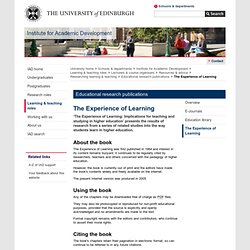
About the book The Experience of Learning was first published in 1984 and interest in its content remains buoyant; it continues to be regularly cited by researchers, teachers and others concerned with the pedagogy of higher education. However, the book is currently out of print and the editors have made the book's contents widely and freely available on the internet. The present Internet version was produced in 2005. Using the book Any of the chapters may be downloaded free of charge as PDF files.
They may also be photocopied or reproduced for non-profit educational purposes, provided that the source is explicitly and openly acknowledged and no amendments are made to the text. Formal copyright remains with the editors and contributors, who continue to assert their moral rights. Citing the book. Learning Theory v5 - What are the established learning theories? Enquiry-Based Learning (CEBEL)
Journal of Workplace Learning. CRADLE - Center for Research on Activity, Development, and Learning - University of Helsinki - Faculty of Behavioural Sciences. Professor John Krinsky, Associate Professor at The City College of New York, and Colin Barker, Senior Lecturer in Sociology at Manchester Metropolitan University, retired, will give lectures in the launching seminar of the new project 'Learning in Productive Social Movements', headed by Professor Yrjö Engeström.
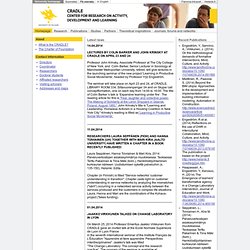
The seminar will take place on April 23 and 24, at CRADLE, LIBRARY ROOM 334, Siltavuorenpenger 3A and on Skype/ call conceptformation, one on each day from 14:00 to 16:00. Behaviourism. If you want to follow your own links, use "behaviorism" (sic.)
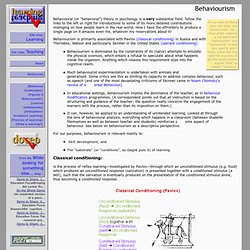
Most of the material is US-based and "behaviorism" and "behaviorist" is how they spell it, and I freely admit that this side-bar is purely to get the stupid search engine "bots" to register "behavior" Behavioural (or "behavioral") theory in psychology is a very substantial field: follow the links to the left or right for introductions to some of its more detailed contributions impinging on how people learn in the real world. How I have the effrontery to produce a single page on it amazes even me, whatever my reservations about it! Behaviourism is primarily associated with Pavlov (classical conditioning) in Russia and with Thorndike, Watson and particularly Skinner in the United States (operant conditioning). Behaviourism is dominated by the constraints of its (naïve) attempts to emulate the physical sciences, which entails a refusal to speculate about what happens inside the organism.
Classical conditioning: Education Theory/Constructivism and Social Constructivism - UCD - CTAG. "Constructivism is the philosophical and scientific position that knowledge arises through a process of active construction.
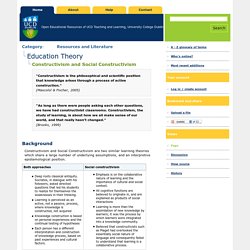
"(Mascolol & Fischer, 2005) "As long as there were people asking each other questions, we have had constructivist classrooms. Engestrom Expansive Learning - pagi. Chapter 4 Yrjö Engeström Yrjö Engeström is the founder and leader of the Center for Activity Theory and Developmental Work Research at the University of Helsinki in Finland and is at the same time Professor at the University of California, San Diego.

He fundamentally builds his theoretical work on the so-called cultural-historical or activity-theoretical approach to learning and mental development, which was first launched in the Soviet Union in the 1920s and 30s by Lev Vygotsky. Expansive learning. This article or section is incomplete and its contents need further attention.
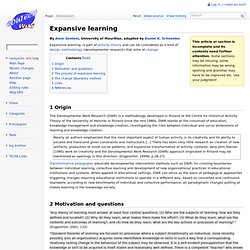
Some sections may be missing, some information may be wrong, spelling and grammar may have to be improved etc. Use your judgment! By Alain Senteni, University of Mauritius, adapted by Daniel K. Schneider. INFED learning, education and community. Featured Updated: What is a group?
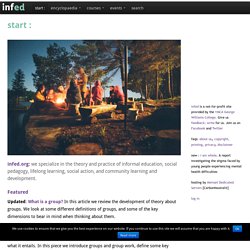
In this article we review the development of theory about groups. We look at some different definitions of groups, and some of the key dimensions to bear in mind when thinking about them. Learning Theories, Learning Models, Learning Theory Summaries - in Plain English! Learning Theories. Learning and Teaching Home. Learning theory (education) A classroom in Norway.
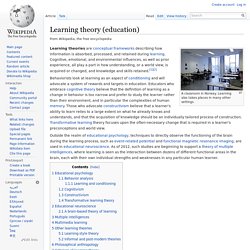
Learning also takes places in many other settings. Learning theories are conceptual frameworks describing how information is absorbed, processed, and retained during learning. Cognitive, emotional, and environmental influences, as well as prior experience, all play a part in how understanding, or a world view, is acquired or changed, and knowledge and skills retained.[1][2] Main article: Behaviorism The term "behaviorism" was coined by John Watson (1878–1959). Knowles' andragogy: an angle on adult learning. Malcolm Knowles' "Andragogy" (supposedly the adult equivalent of "pedagogy") is a leading "brand" in adult education theory: Andragogy assumes that the point at which an individual achieves a self-concept of essential self-direction is the point at which he psychologically becomes adult.
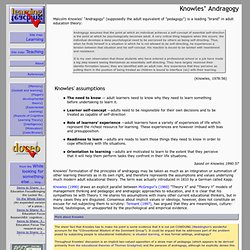
A very critical thing happens when this occurs: the individual develops a deep psychological need to be perceived by others as being self-directing. Thus, when he finds himself in a situation in which he is not allowed to be self-directing, he experiences a tension between that situation and his self-concept. His reaction is bound to be tainted with resentment and resistance. It is my own observation that those students who have entered a professional school or a job have made a big step toward seeing themselves as essentially self-directing. Knowles' assumptions The need to know — adult learners need to know why they need to learn something before undertaking to learn it. based on Knowles 1990:57.